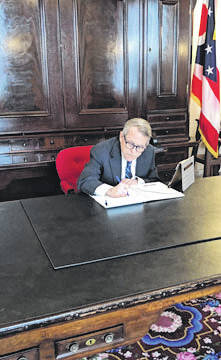
COLUMBUS — Mike DeWine has been governor of Ohio for about a month and so far has encountered just one surprise.
But it’s a big one.
A $1.5 billion shocker.
That’s the shortfall the state is facing in the highway fund, and DeWine is trying to figure out how to cover it as he works on his various budgets.
“We knew that was a bad situation, I did not realize how bad it was,” the Greene County native said from his office inside the Statehouse last week. “You’ve got what I call a structural debt that’s been brought about by several things.”
People are driving more miles and putting more wear and tear on the roads while driving more fuel-efficient vehicles, he said. That means drivers are spending less at the pumps, lowering the revenue the state’s 28 cents per gallon gas tax produces. Factor in the ever-increasing construction costs — a dollar raised by the tax in 2005 is worth 59 cents now — and it adds up.
Or maybe doesn’t add up.
“We can’t borrow anymore money,” DeWine said. “We shouldn’t borrow anymore money. It’s not the right thing to do. The prudent thing to do is to pay for highways as we go but not increase the deficit.”
Previous administrations went into debt to cover the problem, but DeWine said the state’s credit cards are maxed out.
DeWine said when the state collects money for highways, the first $390 million goes to pay for debt service.
“We’re going to pay on bonds 20 years,” he said. “We’ve already benefitted from it. That’s totally irresponsible to continue that anymore. We inherited this. Not something I want to deal with. It’s something we have to deal with.”
DeWine instructed ODOT to see where it can cut expenses, but he said additional revenue sources will be needed and added that he is working on a transportation budget, which is generally introduced before the general budget, due March 15.
Local municipalities — which receive 39 percent of ODOT’s highway money — will see less help from the state as revenues decline.
And as revenue goes down, so will the quality of the existing roads, DeWine said. If the status quo is maintained, that state will see no new roads according to DeWine.
“We can’t keep up to our roads,” he said. “You’re going to see a degradation of our roads and as well as our bridges. It’s a real crisis.”
A one-penny increase in the gas tax would generate about $66 million a year for Ohio, according to media reports. And said increase is reportedly being tossed around in Columbus.
While it remains to be seen what DeWine proposes in his transportation budget, he said his general budget will not have too many surprises. Early childhood education and development, more opportunities for residents to get drug treatment, K-12 education prevention, and an increase in drug task forces to help fight the opioid crisis will take center stage. His budget will also include some help with the lack of local government funds with a proposed increase in money spent for children’s services.
Regarding education, DeWine said school funding is always an issue.
“One thing we know is poorer children take more money,” he said. “They take more money because many times you have to do wrap-around services to other things to help that child. My experience has been is that when anybody introduces a budget, most schools don’t think that they’re getting a fair shake.”
DeWine said his priority is making sure every child has a good education.
“It is a process,” he said. “The legislature ultimately has the final say on that. We will propose a budget. Guided by the fact they’re trying to bring about equality and every child having an opportunity to succeed.”
DeWine didn’t forget about the state’s largest single-site employer — Wright-Patterson Air Force Base — as he transitioned from attorney general to governor. He named retired Air Force Col. Joe Zeis as a cabinet member focused on protecting and positioning Ohio’s military installations and assets.
“He has great familiarity with Wright-Patt,” DeWine said. “If you want something done or something focused on, you better give someone that job and that’s their only job. His job is to wake up every day and worry about our military installations.”
Zeis is part of a diverse cabinet that includes more women than men, and some minorities.
“Our goal was to find the best people we could,” DeWine said. “It’s important that the cabinet reflect Ohio.”
Aside from the billion dollar issue, DeWine is pleased with how his first four weeks have gone.
“Very happy,” he said.


